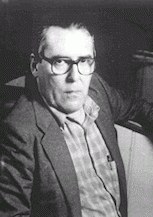2. Anglès
can pass through the svelte body of a needle.
They have met the challenge Christ gave them
with surprising ease. Christ
did not notice the great agility of camels.
The saddest thing is that it is only them that find
all salvation and they cartelise it for themselves alone …
Camels, once they have passed through the body of a needle,
stretch, dust themselves down, get their hoofs cleaned,
clap their hands, ask for a newspaper, a coffee, a glass of something
the cigar of redemption, the little dove of peace
and amnesty for all.
We must admit, not without certain affliction,
they've set the stakes high and beat us and it's all the fault
of Christ, the angelic and good faith of Christ.
Now everything is so confused, so distressing …
Now our best lady friends are their beloveds,
like Justice, like …
Everywhere one runs into their representatives
armed or with crosses and dressed in black to scare us
and all of them cause in us the most dismal weariness
in which we are steeped from dawn to dusk.
There are confident camels that, dressed fit to kill,
smile upon us and let us sniff their buttonhole flower,
give us work and some small treat at Christmas.
But the not-so-secure camels look bad,
kicking people and with humps all a-twitch. It is known
that they don't look kindly
on each other. They all move around,
run, lay traps, get up people’s noses,
associate, fight, take up arms, lay down arms,
make war, amnesties, colonise, kill blacks,
get independence, do business.
(From Una bella història (A Beautiful Story), 1962)
* * *
Statelessness. Having a country – with the visible form of a State – is obligatory so that we don't systematically run away from the deep responsibilities of our tribe and defend ourselves from ourselves perennially living in a state of abject knavery. Otherwise, tribality is revealed in the form of unsightly, obscene and woolly sentimentality, and this must be stamped out. A State produces corruption and other inconveniences but worse are those that arise from the fact of not having one.
One stateless person is lovely; four hundred thousand, concentrated, coexisting together, are a disgusting inanity. A tribe must have a country, at least to look after the poets and poetesses that appear in its bosom and specifically to pay its respects to them for their language and because they are better acquainted with the rules of their tribality (triviality) … Anyone who represents the contrary is only a manifestation of Evil. The matter is amply explained in the Bible. I understand that you systematically reject the tribute of blood that is needed to construct it. It is brutal this tax, but it seems there is no alternative, that Evil wins. And one must be obsequious with Evil.
Dulce et decorum est pro patria mori. It is little, very little. One must do more. One must slaughter the enemy, show no tolerance. The worst of being born in the bosom of a commune without a State is the amount of time one wastes in trying to construct it. This also has advantages but I, personally, would have preferred to have things sorted out.
Anti-Catalanism. This is something that, being exotic and complex, interests any scholar in America as a subject worthy of study.
At bottom, the founders, promoters and conservers-maintainers of anti-Catalanism have been and are true-blue, properly-raced Catalans: with broad face … or of whatever shape you like: of priests, anarchists, fascists, communists … As for this second item, lamentably, it is not at all original: in every commune appears the same phenomenon, which has stopped being mysterious and not because it is so extended. A very ad hoc explanation might be: when one is very much, too much, for something, a movement very like regression occurs, an instinct of being different, although physical appearances do not consent to such modifications but, rather, betray them.
A Czech, newly independent of the Slovaks, was asked what one should call his place from now on since it was clear that the Slovaks’ place would be called Slovakia. And he very seriously replied that he didn’t know, that the Parisians would find a suitable name. I was amazed: was this an insult to the Parisians, suggesting that they were frivolous people who are more interested in the name than the thing, or was it rendering them homage, considering they were specialists in these affairs? In any case, it was shocking for me as one belonging to a tribe that, more than anything else, bases its claim for independence on the fact of having its own name rather than the fact of being a certain way, at least in the times in which it has been my lot to experience this. We are so busy fleeing the latter that a monk from Montserrat very proudly said – to justify the unclassifiable status quo – that our main feature was not belonging to a race, "like dogs that are not thoroughbred", he stressed. If it was really so cut and dried, why would we want to be independent? It would be like wanting to pay the toll on a road that doesn't charge one. A total absurdity. Lamentably we can't share the monk's euphoria: we are raced and well-raced at that. They can pick us out from a mile away, especially our enemies, who are the ones we should identify for once and for all so that we can separate, without explanation, without even knowing the name of the thing, like that Czech.
(From El canvi (The Change), 1998)
Translated from the Catalan by Julie Wark ©


